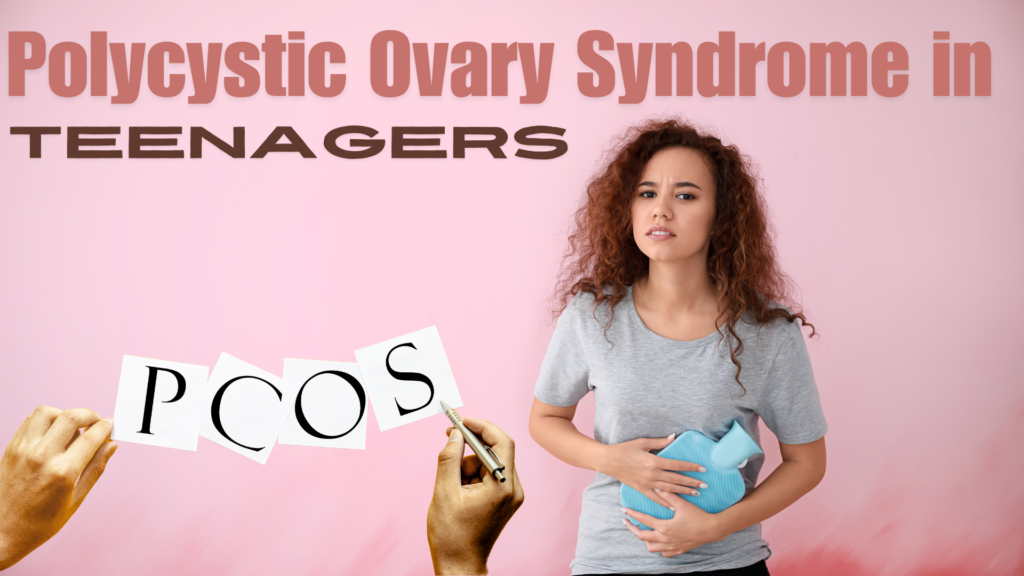
This comprehensive guide delves into polycystic ovary syndrome in teenagers, its symptoms, causes, and effective solutions, empowering teens and their families with actionable insights.
Polycystic Ovary Syndrome (PCOS) is a common hormonal condition that impacts millions of women globally, often starting in their teenage years. Characterized by a range of physical and emotional symptoms, PCOS can significantly affect a teen’s life. Yet, with proper understanding, timely diagnosis, and effective management, the challenges of PCOS can be overcome.
What Is Polycystic Ovary Syndrome in Teenagers?
Polycystic Ovary Syndrome (PCOS) is a hormonal disorder that disrupts the normal functioning of a teen’s ovaries. It is caused by an imbalance in reproductive hormones, leading to irregular or absent menstrual periods, the formation of ovarian cysts, and symptoms like acne and excessive hair growth.
In teenagers, PCOS often coincides with puberty, making it difficult to distinguish from normal hormonal changes. Left untreated, PCOS can affect fertility, metabolism, and even mental health, making early recognition crucial.
Key Symptoms of PCOS in Teenagers
Teens with PCOS may experience a variety of symptoms. Some of the most common include:
- Irregular Periods: Fewer than eight periods per year, skipped cycles, or periods that are very light or extremely heavy.
- Excess Hair Growth: Unwanted hair on the face, chest, back, or other areas—a condition called hirsutism.
- Severe Acne: Persistent or resistant acne caused by increased levels of male hormones (androgens).
- Weight Gain or Obesity: A tendency to gain weight, particularly around the abdomen, which can worsen insulin resistance.
- Thinning Hair: Hair loss or thinning on the scalp resembling male-pattern baldness.
- Darkened Skin Patches: Velvety, dark patches of skin on the neck, armpits, or groin due to insulin resistance.
While not all teens will experience every symptom, even one or two of these signs can indicate PCOS and warrant further investigation.
What Causes PCOS in Teenagers?
Although the exact cause of PCOS is not fully understood, researchers have identified several contributing factors:
- Hormonal Imbalance:
PCOS is marked by an overproduction of androgens (male hormones) that disrupt the ovulation process. - Insulin Resistance:
Many teens with PCOS have insulin resistance, where the body’s cells don’t respond properly to insulin, leading to higher insulin levels and triggering excess androgen production. - Genetic Predisposition:
A family history of PCOS, type 2 diabetes, or other hormonal disorders increases the likelihood of developing PCOS. - Lifestyle Factors:
Poor diet, lack of exercise, and stress can exacerbate hormonal imbalances and symptoms of PCOS. - Inflammation:
Chronic, low-grade inflammation is often observed in teens with PCOS, further increasing androgen levels.
Diagnosing PCOS in Teenagers
Diagnosing PCOS in teens can be challenging because many symptoms, such as irregular periods and acne, overlap with normal puberty. Medical professionals rely on the following diagnostic criteria:
- Medical History: A detailed review of menstrual patterns, symptoms, and family history of hormonal or metabolic disorders.
- Physical Examination: Checking for signs of excess androgens, such as hirsutism or acne.
- Blood Tests: Measuring hormone levels, insulin resistance, and glucose levels.
- Ultrasound: Detecting ovarian cysts, though not all teens with PCOS have visible cysts.
It’s essential to consult a healthcare provider if PCOS is suspected, as early diagnosis can help prevent long-term complications.
How PCOS Affects Teenagers
PCOS impacts teens beyond their reproductive system, affecting their physical health, emotional well-being, and social interactions:
- Physical Health:
- Teens may experience difficulty maintaining a healthy weight due to hormonal imbalances.
- Insulin resistance increases the risk of type 2 diabetes and cardiovascular disease.
- Emotional and Mental Health:
- The visible symptoms of PCOS, like acne and hirsutism, can lead to low self-esteem.
- Teens with PCOS are more likely to experience anxiety and depression.
- Social Challenges:
- Struggling with appearance-related insecurities can impact friendships and social confidence.
Managing PCOS in Teenagers
The good news is that PCOS is manageable with a combination of lifestyle changes, medical treatments, and emotional support. Here are the most effective strategies:
1. Lifestyle Modifications
- Healthy Eating Habits:
A balanced diet rich in whole grains, lean proteins, healthy fats, and plenty of fruits and vegetables can help regulate insulin levels.- Tip: Avoid processed foods and limit sugary beverages.
- Regular Exercise:
Physical activity improves insulin sensitivity, helps with weight management, and reduces stress.- Activities like walking, swimming, or yoga are excellent for teens.
2. Medical Treatments
- Hormonal Birth Control:
Birth control pills can regulate menstrual cycles and reduce androgen-related symptoms like acne and excess hair growth. - Metformin:
This medication is often prescribed to improve insulin sensitivity and lower blood sugar levels. - Anti-Androgen Medications:
These medications can block androgen effects, reducing hair growth and acne.
3. Emotional and Mental Health Support
- Therapy and Counseling:
Talking to a therapist can help teens navigate the emotional challenges of PCOS. - Support Groups:
Joining a PCOS support group can provide a sense of community and shared understanding.
Can Polycystic Ovarian Syndrome Go Away?
While PCOS cannot be cured, its symptoms can improve significantly with proper management. Some teens find that their symptoms lessen with age, particularly if they adopt healthy lifestyle habits. Regular medical checkups and personalized care plans are essential to monitor progress and prevent complications.
What Is the Difference Between PCOD and PCOS?
PCOD (Polycystic Ovarian Disease) is a milder form of ovarian cyst formation, typically without severe hormonal imbalances. PCOS (Polycystic Ovary Syndrome), on the other hand, is a more complex disorder involving hormonal, metabolic, and reproductive issues.
Conclusion
Polycystic Ovary Syndrome in teenagers is a complex but manageable condition. Early diagnosis, a supportive healthcare team, and a proactive approach can significantly improve outcomes. Encouraging teens to embrace a healthy lifestyle and seek emotional support can help them thrive despite PCOS.
If you or someone you know is dealing with PCOS, remember: You’re not alone, and help is always available.
Frequently Asked Questions
What is PCOS problem in females?
PCOS is a hormonal disorder that affects menstrual cycles, fertility, and overall health. It’s characterized by symptoms such as irregular periods, excess hair growth, and weight gain.
What causes PCOS in teenagers?
PCOS is caused by hormonal imbalances, insulin resistance, genetics, and lifestyle factors.
How is PCOS treated in teens?
Treatment typically involves lifestyle changes, hormonal medications, and sometimes insulin-sensitizing drugs like metformin.
Does PCOS only affect the ovaries?
No, PCOS affects the entire body, including metabolism, skin, hair, and emotional health.
Can PCOS in teenagers go away on its own?
While symptoms may improve over time, PCOS requires ongoing management to prevent long-term health issues.
What are the risks of untreated PCOS?
Untreated PCOS can lead to complications such as type 2 diabetes, heart disease, infertility, and mental health challenges.

